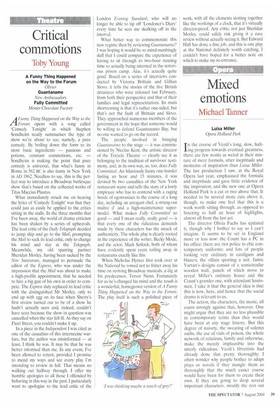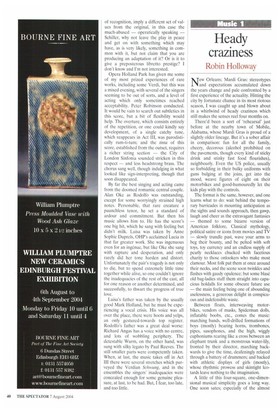Mixed emotions
Michael Tanner
Luisa Miller Opera Holland Park
In the course of Verdi's long, slow, battling progress towards eventual greatness, there are few works as weird in their mixture of mere formula, utter ineptitude and moments of inspiration than Luisa Miller, The last production I saw, at the Royal Opera last year, emphasised the formula and ineptitude and gave little evidence of the inspiration, and the new one at Opera Holland Park is a cut or two above that. It needed to be several more cuts above it, though, to make one feel that this is a work worth sitting through, as opposed to listening to half an hour of highlights, almost all from the last act.
The director Olivia Fuchs has updated it, though why I bother to say so I can't imagine. It seems to be set in England more or less now: the Count has a PC in his office: there are riot police in chic contemporary uniforms: and lots of people looking very ordinary in cardigans and blazers, the villain sporting a suit. Jamie Vartan's designs consist of a semicircular wooden wall, panels of which move to reveal Miller's ordinary house and the Count's grander one, with attendant huntsmen. I take it that the general idea is that this is now, here, and hence that the social drama is relevant to us.
The action, the characters, the music, all count strongly against that, however. One might argue that they are no less plausible in contemporary terms than they would have been at any stage history. But this degree of naivety, the swearing of solemn oaths, the use of vials of poison, the whole network of relations, family and otherwise, make the merely implausible into the utterly ridiculous. Verdi's librettists had already done that pretty thoroughly: I often wonder why people bother to adapt plays or novels if they mangle them so thoroughly that the much easier course would have been for them to create their own. If they are going to drop several important characters, modify the rest out of recognition, imply a different set of values from the original, in this case the much-abused — operatically speaking — Schiller, why not leave the play in peace and get on with something which may have, as is very likely, something in common with it, but not claim that you are producing an adaptation of it? Or is it to give a preposterous libretto prestige? I don't know and I'm not interested.
Opera Holland Park has given me some of my most prized experiences of rare works, including some Verdi, but this was a mixed evening, with several of the singers seeming to be out of sorts, and a level of acting which only sometimes reached acceptability. Peter Robinson conducted. It would be vain to search out subtleties in this score, but a bit of flexibility would help. The overture, which consists entirely of the repetition, or one could kindly say development, of a single catchy tune, which reappears in Act III, was parodistically rum-ti-turn; and the tinta of this score, established from the outset, requires a richer string section — the City of London Sinfonia sounded stricken in this respect — and less headstrong brass. The chorus sang well, though indulging in what looked like sign-interpreting, though that soon disappeared.
By far the best singing and acting came from the doomed romantic central couple. Alan Oke as Rodolfo was outstanding, except for some worryingly strained high notes. Personable, that rare creature a paunchless tenor, he set a standard of ardour and commitment. But then his music allows him to. He has the score's one big hit, which he sang with feeling but didn't milk. Luisa was taken by Anne Sophie Duprels, OHP's acclaimed Lucia in that far greater work. She was ingenuous even for an ingenue, but like Oke she sang with rapture and desperation, and only rarely did her tone harden and distort. Unfortunately the pair's tragedy is not only to die, but to spend extremely little time together while alive, so one couldn't ignore the inadequacies of the rest of the cast, all for one reason or another determined, and successfully, to thwart the progress of true love.
Luisa's father was taken by the usually good Mark Holland, but he must be experiencing a vocal crisis. His voice was all over the place, there were hoots and yelps, an only gestured-towards top register. Rodolfo's father was a great deal worse: Richard Angas has a voice with no centre, and lots of wobbling periphery. The detestable Wurm, on the other hand, was sung with silky legato by Paul Reeves. The still smaller parts were competently taken. When, at last, the music takes off in Act III there were several stretches which purveyed the Verdian Schwung, and in the ensembles the singers' inadequacies were concealed enough for some genuine pleasure, at last, to be had. But, I fear, too late, and too little.



























































 Previous page
Previous page